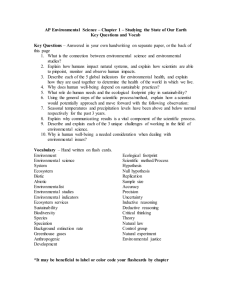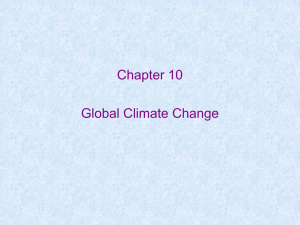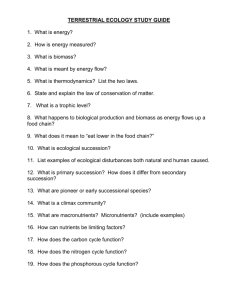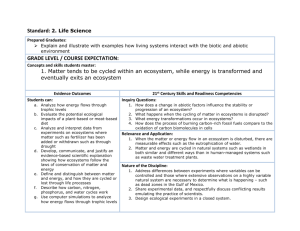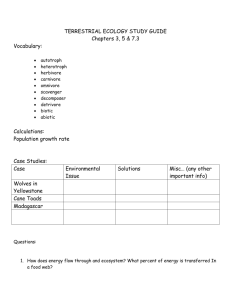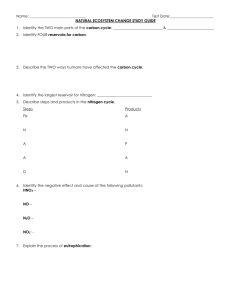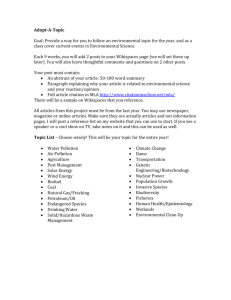Energy and the Environment Dr. Scott Harrison BC Hydro Field Operations
advertisement
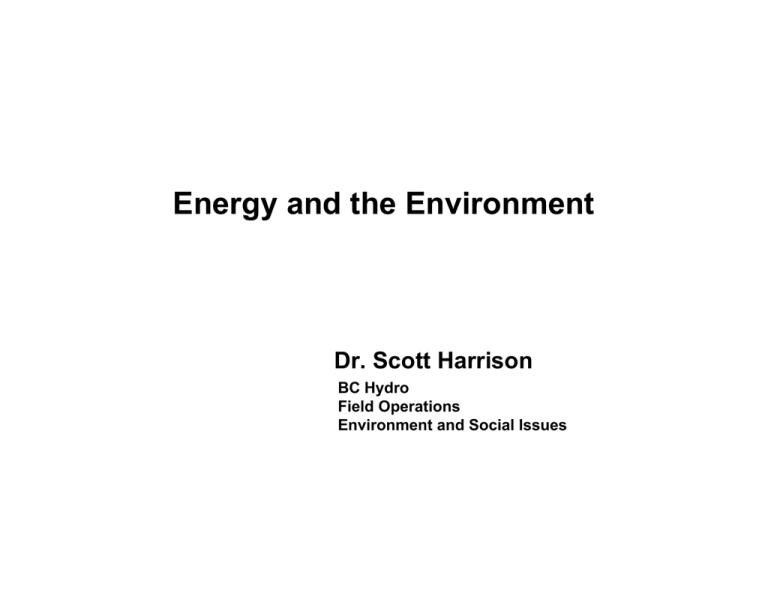
Energy and the Environment Dr. Scott Harrison BC Hydro Field Operations Environment and Social Issues 1. The Earth is a finite, closed ecological system. 2. Humans require natural resources. (ecological goods and services) 3. Natural resources are the result of Ecological Processes. 4. Maintaining ecological processes yields Ecological Resiliency. Sustainability is the integration of social well-being, economic prosperity, and ecological resilience. Nature Flat Views of Nature - system is stable only if forces equal - management can control system if “correct” level of use is discovered Nature Balanced - if disturbed, will return to equilibrium - management = Maximum Sustainable Yield Nature Anarchic - fundamentally instable - persistence is only possible with minimal demands on Nature - focussed on maintenance of the status quo Nature Resilient - multi-stable states - abrupt and transforming change - management approaches that are adaptive (Gunderson and Holling 2002) Ecological Resilience and the Adaptive Cycle Gunderson and Holling 2002 Adaptive Management 2 - NOT trial-and-error 3 - learning by doing 3 - management as an experiment 3 - uses quantifiable objectives and experimental design (Walters 1989) The Millennium Ecosystem Assessment (United Nations 2005) - 4-year examination of global ecosystems - 1,360 scientists, economists, business professionals from 95 countries - examined changes over last 50 years - highlighted the importance of ecosystem services for human well-being and business development Status of the world’s ecosystem services Degraded Mixed Enhanced Provisioning Capture fisheries Wild foods Biomass fuel Genetic resources Biochemicals Fresh water Timber Fiber Crops Livestock Aquaculture Regulating Air quality regulation Climate regulation Erosion regulation Water purification Pest regulation Pollination Natural hazard regulation Water regulation Disease regulation Carbon sequestration Cultural Spiritual values Aesthetic values Recreation & ecotourism The Millennium Ecosystem Assessment (2005) Energy Priorities for true Sustainability 1. Ecological sustainability (closed-system approach for a single planet) 2. Reduced consumption (lower human demands on global ecosystems and ecosystem services) 3. “Green” (includes effects on ecosystems and ecosystem services with appropriate regulatory certification and monitoring) 4. “Clean” (focus on G.H.G. – ignores ecosystem aspects, such as biodiversity, cumulative effects, water quality, wilderness values, and many others) Given that true Ecological Sustainability (previous slide) is unlikely in current political climate, practical approaches to achieving sustainability must include ALL three pillars: 1.social well-being 2.economic prosperity 3.ecological resilience • transmission infrastructure has capacity to meet growing demand. • transmission congestion relief policy. • procurement that recognizes value of aggregated intermittent resources • review BC Utilities Commissions’ role considering social and environmental costs and benefits. Environmental Impact Goal “No net incremental environmental impact by 2024” [from 2004 baseline] BC Hydro – Participation in international initiatives Ecosystem Services Review Method to help business identify their dependence and impact on ecosystems BC Hydro – Participation in international initiatives The Economics of Ecosystems and Biodiversity (TEEB) - report on the global economic benefit of biological diversity - the cost of “failure to take protective measures” - analogous to the Stern Review Dr. Scott Harrison wildlife@bchydro.com
